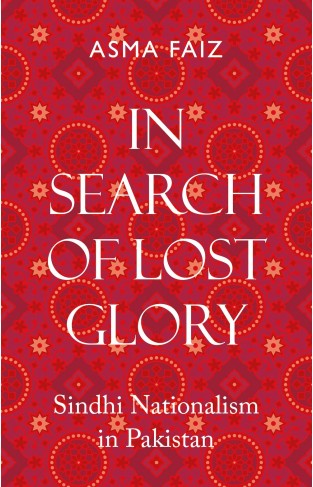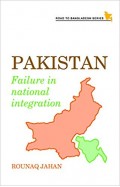In Search of Lost Glory: Sindhi Nationalism in Pakistan
By: Asma Faiz
-
Rs 8,995.50
- Rs 9,995.00
- 10%
You save Rs 999.50.
Due to constant currency fluctuation, prices are subject to change with or without notice.
Sindhi nationalism is one of the oldest yet least studied cases of identity politics in Pakistan. Ethnic discontent appeared in Sindh in opposition to the rule of the Bombay presidency; to the onslaught of Punjabi settlers in the wake of canal irrigation; and, most decisively, to the arrival of millions of Muhajirs (Urdu-speaking migrants) after Partition. Under Zulfikar Ali Bhutto, Benazir Bhutto and Asif Zardari, the Pakistan Peoples Party has upheld the Sindhi nationalist cause, even while playing the game of federalist politics. On the other side for half a century have been hardcore Sindhi nationalist groups, led by Marxists, provincial autonomists, landlord 'pirs' and liberal intelligentsia in pursuit of ethnic outbidding. This book narrates the story of the Bhutto dynasty, the Muhajir factor, nationalist ideologues, factional feuds amongst landed elites, and the role of violence as a maker and shaper of Sindhi nationalism. Moreover, it examines the role of the PPP as an ethnic entrepreneur through an analysis of its politics within the electoral arena and beyond. Bringing together extensive fieldwork and comparative studies of ethno-nationalism, both within and outside Pakistan, Asma Faiz uncovers the fascinating world of Sindhi nationalism.
Sindhi nationalism is one of the oldest yet least studied cases of identity politics in Pakistan. Ethnic discontent appeared in Sindh in opposition to the rule of the Bombay presidency; to the onslaught of Punjabi settlers in the wake of canal irrigation; and, most decisively, to the arrival of millions of Muhajirs (Urdu-speaking migrants) after Partition. Under Zulfikar Ali Bhutto, Benazir Bhutto and Asif Zardari, the Pakistan Peoples Party has upheld the Sindhi nationalist cause, even while playing the game of federalist politics. On the other side for half a century have been hardcore Sindhi nationalist groups, led by Marxists, provincial autonomists, landlord 'pirs' and liberal intelligentsia in pursuit of ethnic outbidding. This book narrates the story of the Bhutto dynasty, the Muhajir factor, nationalist ideologues, factional feuds amongst landed elites, and the role of violence as a maker and shaper of Sindhi nationalism. Moreover, it examines the role of the PPP as an ethnic entrepreneur through an analysis of its politics within the electoral arena and beyond. Bringing together extensive fieldwork and comparative studies of ethno-nationalism, both within and outside Pakistan, Asma Faiz uncovers the fascinating world of Sindhi nationalism.
In Search of Lost Glory: Sindhi Nationalism in Pakistan
By: Asma Faiz
Rs 8,995.50 Rs 9,995.00 Ex Tax :Rs 8,995.50
Zubin Mehta: A Musical Journey (An Authorized Biography)
By: VOID - Bakhtiar K. Dadabhoy
Rs 892.50 Rs 1,050.00 Ex Tax :Rs 892.50
Pakistan: Failure in National Integration
By: Rounaq Jahan
Rs 845.75 Rs 995.00 Ex Tax :Rs 845.75
The Origins of Political Order From Prehuman Times to the French RevolutioN
By: Francis Fukuyama
Rs 4,045.50 Rs 4,495.00 Ex Tax :Rs 4,045.50
Pakistan: Failure in National Integration
By: Rounaq Jahan
Rs 845.75 Rs 995.00 Ex Tax :Rs 845.75
A Desolation Called Peace: Arkady Martine (Teixcalaan, 2)
By: Arkady Martine
Rs 2,035.75 Rs 2,395.00 Ex Tax :Rs 2,035.75
The Secrets We Kept: The sensational Cold War spy thriller Paperback
By: Lara Prescott
Rs 1,270.75 Rs 1,495.00 Ex Tax :Rs 1,270.75
Wahala: Three friends, three ‘perfect’ lives. Here Comes Trouble
By: Nikki May
Rs 1,780.75 Rs 2,095.00 Ex Tax :Rs 1,780.75
The Princess in Black and the Mermaid Princess
By: Shannon Hale
Rs 1,615.50 Rs 1,795.00 Ex Tax :Rs 1,615.50
110 Spelling Flash Cards for ages 7-9
By: Scholastic Inc
Rs 1,525.75 Rs 1,795.00 Ex Tax :Rs 1,525.75
Evidence-Based Practice for Nurses: Appraisal and Application of Research
By: Nola A. Schmidt
Rs 807.50 Rs 950.00 Ex Tax :Rs 807.50
Little Miss Classic Library Little Miss Contrary 29
By: Roger Hargreaves
Rs 397.50 Rs 795.00 Ex Tax :Rs 397.50
The Batman and Scooby-Doo Mysteries Vol. 3
By: Sholly Fisch
Rs 3,310.75 Rs 3,895.00 Ex Tax :Rs 3,310.75
Make Your Bed: A Daily Journal
By: Admiral William H. McRaven
Rs 1,270.75 Rs 1,495.00 Ex Tax :Rs 1,270.75
Geronimo Stilton: Lost Treasure of the Emerald Eye
By: Geronimo Stilton
Rs 1,147.50 Rs 2,295.00 Ex Tax :Rs 1,147.50
Good Power - Leading Positive Change in Our Lives, Work, and World
By: Ginni Rometty
Rs 9,895.50 Rs 10,995.00 Ex Tax :Rs 9,895.50
The Making of Poetry - Coleridge, the Wordsworths and Their Year of Marvels
By: Adam Nicolson
Rs 1,950.75 Rs 2,295.00 Ex Tax :Rs 1,950.75
The Torrents of Spring - A Romantic Novel in Honor of the Passing of a Great Race
By: Ernest Hemingway
Rs 845.75 Rs 995.00 Ex Tax :Rs 845.75
The Great Reset: And the War for the World
By: Alex Jones
Rs 5,935.50 Rs 6,595.00 Ex Tax :Rs 5,935.50
Zubin Mehta: A Musical Journey (An Authorized Biography)
By: VOID - Bakhtiar K. Dadabhoy
Rs 892.50 Rs 1,050.00 Ex Tax :Rs 892.50
In Search of Lost Glory: Sindhi Nationalism in Pakistan
By: Asma Faiz
Rs 8,995.50 Rs 9,995.00 Ex Tax :Rs 8,995.50
Pakistan: Failure in National Integration
By: Rounaq Jahan
Rs 845.75 Rs 995.00 Ex Tax :Rs 845.75














-120x187.jpg?q6)












-120x187.jpg?q6)


-120x187.jpg?q6)
































